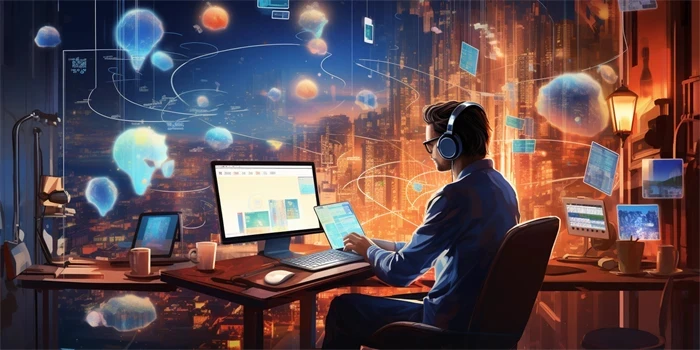In recent years, artificial intelligence (AI) has made significant strides in revolutionizing various aspects of our lives. From self-driving cars to virtual assistants, AI-powered smart devices have become increasingly prevalent in our homes. These devices offer a seamless integration of technology and convenience, transforming our living spaces into futuristic hubs of automation. In this article, we will explore how AI-powered smart devices can revolutionize your home in several key areas.

1. Home Security
AI-powered smart devices can greatly enhance the security of your home. For instance, smart cameras equipped with facial recognition technology can identify individuals and alert you in real-time, providing an additional layer of protection. These cameras can also integrate with your smartphone, allowing you to remotely monitor your property when you are away. Furthermore, AI algorithms can analyze patterns and detect anomalies, enabling proactive security measures such as automatically locking doors or notifying authorities in case of a break-in.
2. Energy Efficiency
Smart devices equipped with AI algorithms can optimize energy usage in your home, resulting in significant cost savings. AI-powered thermostats, for example, can learn your preferences and automatically adjust the temperature based on your schedule and occupancy patterns. This helps to reduce unnecessary energy consumption. Additionally, AI can integrate with smart lighting systems to adjust brightness levels and turn off lights when not in use, further maximizing energy efficiency.
3. Home Entertainment
Transform your living room into a state-of-the-art entertainment center with AI-powered smart devices. Voice-controlled virtual assistants, such as Amazon’s Alexa or Google Assistant, can play your favorite music, provide movie recommendations, and even control your smart TV. These devices can also integrate with streaming services, allowing you to easily access a wide range of content with just a voice command. Say goodbye to searching for remote controls or struggling to find the perfect movie!
4. Smart Kitchen
Say hello to the future of cooking with AI-powered smart devices in your kitchen. Intelligent appliances, such as smart refrigerators and ovens, can provide valuable assistance in meal planning and preparation. For instance, a smart refrigerator can suggest recipes based on the ingredients it detects inside and even create an automated grocery list. AI-powered ovens can analyze the weight and composition of your food, ensuring precise cooking times and temperatures for perfectly cooked dishes.
5. Health and Wellness
AI-powered smart devices can also contribute to better health and wellness in your home. Smart wearables, like fitness trackers, can monitor your heart rate, sleep patterns, and overall activity levels, providing valuable insights into your well-being. These devices can also offer personalized suggestions for exercise routines and nutrition plans based on your goals and lifestyle. By leveraging AI, you can take proactive steps towards a healthier lifestyle without the need for expensive personal trainers or nutritionists.
6. Smart Home Management
AI-powered smart home management systems can bring all your devices together under one cohesive interface. These systems act as a centralized hub, allowing you to control and monitor all your AI-powered devices from a single app or voice command. You can create customized routines that automate various tasks, such as turning off lights, adjusting the temperature, or even brewing your morning coffee. With AI-powered smart home management, you have complete control over your home’s automation, making your life simpler and more efficient.
7. Productivity and Efficiency
AI-powered smart devices can significantly improve productivity and efficiency in your home. Virtual assistants, like Google Assistant or Siri, can help you manage your schedule, set reminders, and even make calls or send messages on your behalf. These devices can also integrate with other productivity tools, such as calendars or note-taking apps, to streamline your workflow. With AI-powered assistance, you can stay organized, focused, and accomplish tasks with ease.
8. Personalized Experiences
AI-powered smart devices can create personalized experiences tailored to your preferences. For instance, smart speakers can learn your music tastes and curate personalized playlists based on your listening history. Virtual assistants can recognize individual voices, allowing multiple users to access their personalized profiles and receive personalized recommendations. These devices can transform your home into a personalized sanctuary, ensuring that each family member’s preferences are catered to.
Frequently Asked Questions:
Q1: Are AI-powered smart devices secure?
A1: Security is a top priority for manufacturers of AI-powered smart devices. These devices often employ encryption measures, secure connections, and regular software updates to ensure the safety and privacy of your data.
Q2: Can AI-powered smart devices learn from my usage patterns?
A2: Yes, AI algorithms enable devices to learn from usage patterns and adapt accordingly. For example, a smart thermostat can learn your temperature preferences and automatically adjust settings based on your habits.
Q3: Can I control AI-powered smart devices when I’m away from home?
A3: Yes, most AI-powered smart devices can be controlled remotely through smartphone apps or web interfaces. As long as you have an internet connection, you can monitor and control your devices from anywhere in the world.
Conclusion
With AI-powered smart devices, your home can be transformed into a futuristic oasis of automation, convenience, and personalization. From enhancing security and energy efficiency to revolutionizing entertainment and health, these devices offer a myriad of benefits. Embrace the power of AI and revolutionize your home today!
References:
– “The Best AI-Powered Smart Home Devices of 2021” – SmartHome.com
– “How AI Will Revolutionize the Way We Live” – Wired.com
– “AI and the Future of Home Automation” – Forbes.com


